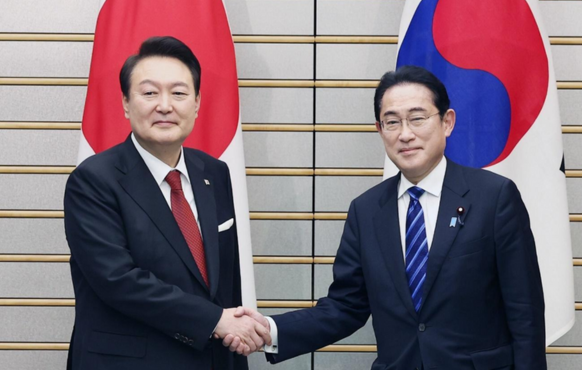
South Korean President Yoon Suk Yeol, left, and Japanese Prime Minister Fumio Kishida at the prime minister’s office in Tokyo, March 16, 2023 - Seattle Times
By: João Velasque (Grade 6)
After the Meiji Revolution, Japan, previously a nation closed to foreign relations, began to assume an expansionist posture, which can be divided into two different phases. The first took place from the end of the 19th century until the First World War, where some Chinese and Korean territories were conquered over six conflicts. The second one, that is the focus of this article, took place during the Showa Era (1926-1989).
This period started when the emperor Hirohito came to power. He adopted a greater governmental centralization, which resulted in political tension, and, after an earthquake that devastated the country, leaned on US investments to reconstruct the nation, which caused an economic crisis following the crash of the New York stock market in 29.
The tormenting atmosphere was perfect for the dissemination of radicalism, and an extremely nationalist posture was adopted. These nationalists believed that expansion was the solution for the problems that they were passing through, based on the experience from other European imperialist nations and on a racist doctrine that saw the “Japanese race” as superior to other Asian peoples.
The Nippon Empire occupied territories throughout Asia, such as Singapura, Thailand, Filipinas, Indochina etc., and parts of China and Korea, where there was an intense conflict.
During this domination process, about eight million people were killed by different types of war crimes, some of them being: civil massacres, forced marches of starving people, cannibalism, forced work, sexual slavery, use of humans as guinea pigs for experiments with biological and chemical weapons.
After Japan’s surrender in World War II, even with all these violations committed, many criminals were not tried, scientists who used human guinea pigs were recruited by the United States and the imperial government was maintained until 1989, as the Americans sought the Japanese alliance in the Cold War.
That is the reason why there still are a lot of protests about this sensible topic, especially in China and Korea. The question is still not completely solved.
After all these years since the end of Japanese Imperialism, a lot of political figures from that time apologized for the atrocities. However, some polemics happened too. There are revisionist Anti-Chinese and Korean movements that negate the war crimes, and even the last two Prime Ministers visited a temple which honors Japanese dead in war, including war criminals.
Taking all this troubled history into consideration, the fact that the current Japanese Prime Minister has met with the Korean Prime Minister to speak about this topic and apologize becomes even more significant. Who knows, maybe in the future the “Land of the Rising Sun” will be able to resolve its past issues in a better way.
Compartilhe esta matéria:
Retornar ao



